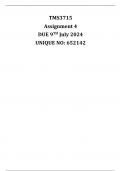TMS3715
Assignment 4
DUE 9TH July 2024
UNIQUE NO: 652142
, Question 1.1: Schema Theory in the Modern South African Classroom
Schema Theory Explanation: Schema theory posits that all knowledge is organized
into units, or schemas. Each schema represents information about an object or
concept, encompassing everything we know about it, including its attributes and the
relationships between them. When new information is encountered, it is either
assimilated into existing schemas or accommodated by modifying schemas to
incorporate the new information.
Relevance in the Modern South African Classroom: In the diverse and multicultural
context of South African classrooms, schema theory is particularly relevant. Learners
come from various backgrounds, bringing different experiences and knowledge. By
activating prior knowledge, teachers can bridge the gap between students'
experiences and new content, making learning more meaningful and effective.
Using Schema Theory to Teach Reading: When teaching reading to home language
learners, schema theory helps in the following ways:
1. Activating Prior Knowledge: Before reading, the teacher can discuss the topic
with students to activate their existing knowledge. For instance, if the reading
material is about traditional South African stories, the teacher can ask
students to share their own experiences or stories they have heard from their
grandparents.
2. Building Background Knowledge: Teachers can provide context or
background information to prepare students for the reading material. For
example, when reading about Nelson Mandela, the teacher could show a
short video or discuss the history of apartheid to build relevant schemas.
3. Predicting Content: Teachers can encourage students to make predictions
about the text based on their schemas. Before reading a story about a South
African hero, students can predict the challenges the hero might face and the
qualities they might exhibit.
4. Connecting to Personal Experiences: Teachers can ask students to relate the
text to their own lives. For example, after reading a story about overcoming
adversity, students can share their own experiences of overcoming
challenges.
Practical Examples:
• Pre-Reading Activity: If the lesson involves reading a story set in a rural South
African village, the teacher can start by discussing what life in a rural village is
like, asking students to share what they know about such settings.
• During Reading Activity: While reading a passage about a local festival, the
teacher can pause and ask students to compare the festival in the text with
festivals they have attended, thus integrating their own experiences with the
new information.
• Post-Reading Activity: After reading a text about wildlife conservation,
students can be asked to draw connections to local conservation efforts or
discuss what they know about South African wildlife, reinforcing the n ew
information within their existing schemas.





